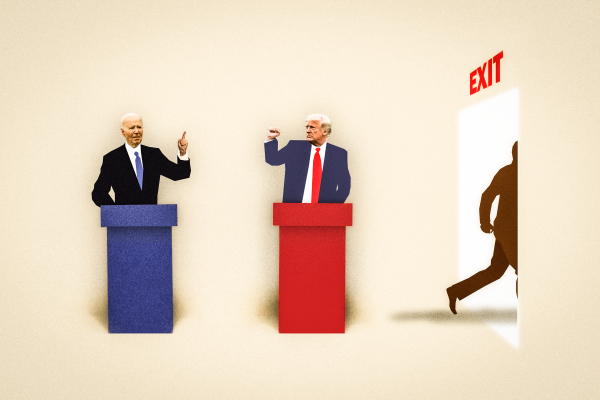Editor’s note: Just as we were about to hit “send” on this newsletter, former President Donald Trump was convicted on all 34 felony counts he was facing in his New York criminal trial. Nick will have lots to say on the verdict in tomorrow’s edition of Boiling Frogs.
When you reach middle age, you find yourself reflecting on the choices you’ve made. “How,” one wonders, “did I arrive at the place where I am in life?”
Today I’m wondering how the hell I ended up making arguments for voting for Joe Biden on a website run by Jonah Goldberg and Steve Hayes.
I haven’t undergone an ideological conversion. I’m not a Biden “fan,” assuming such a thing exists outside the president’s immediate family. There are matters of policy, like immigration, in which the warts-and-all approach of a second Trump administration would be preferable to the Biden administration’s strategy of pretending that a crisis doesn’t exist and hoping nobody notices.
I have to make another choice in November. Given my lack of enthusiasm about the president, why shouldn’t I choose not to choose?
“Choosing Not to Choose” is the title of a new piece by Matthew Franck published today on the site. Trump is wholly unfit for office, Franck allows, but so is Biden for different reasons. And it’s important that Americans not vote for a political candidate they believe is unfit, as one’s vote inevitably influences one’s character. Invest in a corrupt political cause on lesser-of-two-evils grounds and eventually, by feeling obliged to defend it and perhaps embrace it, you too will be corrupted.
I’m tempted to scoff at that and counter that voting isn’t an act of moral validation, just a hard-nosed preference for one of two (usually terrible) options placed before you. But what is this newsletter if not a daily chronicle of how the right’s political investment in Donald Trump eight years ago has led to its utter moral corruption?
Vote for the lesser evil, as Republicans did in 2016, and you’re still voting for evil. Potentially a lot of it, as we discovered after the 2020 election.
In fact, the point of yesterday’s column was that there is, and should be, a limit for classical liberals on how much norm-busting they’ll tolerate from Democrats in the name of defeating the orange menace. Remember: No one is truly Never Trump. There’s a point at which the left might behave so irresponsibly as to make choosing not to choose the only defensible option.
But it’s not a defensible option this year.
My dispute with Franck is simple. I disagree with how he’s framed the choice before voters.
The question isn’t “Biden or Trump?” so much as it’s “Should we continue with the constitutional order as we’ve known it or try something radically different?”
I’ll guarantee here and now that if Trump becomes president again and remains in good health he’ll try to extend his term in office past 2029. I won’t guarantee that he’ll succeed, but the attempt will be made as surely as you’re reading this. Trump is less a person than a personality type and his type is compelled to pursue its own interests remorselessly above all things. I think he’d honestly find it hard to comprehend why someone in his position shouldn’t try to extend their time in power.
Biden won’t do that if reelected. (And not just because he might be catatonic by 2029.) He won’t defy court orders. He won’t stock the leadership of the Justice Department with fanatics who have sworn an oath of allegiance to him personally. He won’t call the military out into the streets to confront people protesting him. And, contra Franck, I don’t believe he’ll claim a “mandate” if he wins, since he’s all but certain to do so with fewer electoral votes than he received in 2020 and with a Republican takeover of the Senate.
All of that is on the table if Trump is reelected, along with even darker insanity that you and I can’t imagine but Stephen Miller assuredly can.
If you view the choice before voters the way Franck does, as one between candidates, I can understand not wanting to invest emotionally in the outcome. If you view it the way I do, as a choice between systems, I can’t imagine declining to do so. Joe Biden’s policy agenda might be “a bad cause,” to borrow Franck’s language, but classical liberalism is not. You should be emotionally invested in its survival.
And I suspect most Biden voters see the stakes of this election my way more so than his.
“The emotional investment of many voters in both Trump and Biden is very high,” Franck writes at one point. We “form attachments to the candidates we vote for—especially if they win and wield power. We feel instinctively that we should defend what they do, even—or especially—when defending them is hard.” That does indeed describe my experience with Trump’s voters; it does not at all describe my experience with the other guy’s.
The opposite is closer to the truth: Hardly anyone is emotionally invested in defending Joe Biden. A poll taken in February found 73 percent of his own party believes he’s too old to serve as president. Another survey published in April saw 57 percent of Democrats say he’s done a “good” or “great” job as president versus 82 percent of Republicans who said so of Trump. Biden’s job approval over the first three months of this year was the lowest of any modern president in his 13th quarter in office. The biggest story of the year in politics to date is the president’s own base bristling at his policy on Israel.
The election is a scant five months away and there’s still chatter about replacing him as nominee at the Democratic convention in August. (Had I the power, I’d do so immediately.) Franck is correct that investing heavily in a corrupt politician will corrupt one’s own character—but where is that investment in Biden’s case, precisely?
In October 2020, Pew asked voters whether they intended to cast their ballot as a show of support for their preferred candidate or as a show of opposition to the alternative. Among Trump voters, 71 percent said they were voting for Trump versus 29 percent who said they were voting against Biden. Among Biden voters, 36 percent said they were voting for Biden versus 63 percent who said they were voting against Trump.
That split among the president’s voters will be even more lopsided this November, I suspect. No one is “investing” in Joe Biden by supporting him. They’re investing in keeping a fascist out of power.
As they should.
There’s another reason not to “choose not to choose” this year. A vote to defeat Trump is a signal to the American right that they must get off the ideological track they’re on if they want to win national elections.
That’s the only incentive left that could conceivably steer them away from authoritarianism. Appealing to them morally has failed. Charging Trump criminally has failed. We face the choice that we do in November only because Republican voters insisted on renominating a coup-plotting twice-impeached civic derelict. There’s no reason to think they’ll stop nominating derelicts until they’re convinced that they can’t win by doing so.
In that context, remaining neutral between Trump and Biden amounts to reassuring Republicans that no matter how low they sink, they’ll never lose your support completely. However flagrantly authoritarian and illiberal they become, you’ll never be so offended by it as to cross the aisle and vote for an establishment Democrat.
For all the emphasis in Franck’s piece about “conscience and character,” maintaining a degree of formal neutrality toward the ongoing perversion of American conservatism also has certain character implications, no?
This is normally the point in the debate at which “none of the above” voters challenge the premise that Joe Biden is mainstream. The more ideologically extreme the president seems, after all, the easier it is for a conservative voter to justify neutrality. Franck is no exception. “Never a strongly principled man even in his prime, Biden has long enjoyed an undeserved reputation as a ‘moderate’ Democrat because he is a trimmer,” he writes. “Now his sails are trimmed to capture the wind that blows from his party’s hard left. As populism is the GOP’s most energetic element, progressivism is the Democrats’.”
True enough on that last point. But most of Biden’s major legislative achievements, beginning with the infrastructure bill, have enjoyed bipartisan support in the Senate. He’s supported Israel from the start of its war with Hamas despite ferocious pressure from the left to do otherwise. And he’s right in line with the spirit of solidarity that Reaganites feel for Ukraine with respect to Russia.
He’s considerably left of where I’d prefer a president to be, but he ain’t Elizabeth Warren.
With due respect to Franck, my sneaking suspicion about conservatives who insist on neutrality in this election on ideological grounds is that no Democrat will ever be centrist enough for them to justify voting for. That’s because, as nominee, even a moderate liberal would need to take care not to be too hostile toward progressives lest they begin hemorrhaging votes from their base. And so that nominee can—and would—be attacked on the right as “owned by the left” and therefore unsupportable in good conscience.
Our own Jonah Goldberg has wondered at times why Never Trump conservatives who intend to vote for Biden don’t use their electoral leverage to drag him to the right on policy. People like me are “cheap dates,” he’s suggested, insofar as we’re pledging our support to the party of the left in exchange for … nothing.
I take the point. But I’d say it’s less a matter of my vote being cheap than his vote being a little too expensive under the circumstances.
The truth is that I don’t have much leverage over Democrats, and it’s Republicans’ fault that I don’t. Had the GOP nominated someone somewhat less objectionable, like Ron DeSantis, I would have felt more comfortable making demands of the left for my vote. I’d prefer not to be governed by an uncharismatic post-liberal, but the prospect of a DeSantis presidency isn’t so terrifying that I’d support Biden no matter what.
But when Ex-President Putsch is the nominee? I can’t say it enough: Preserving the constitutional order is not just another “issue set.” I’m not in a position to barter with Biden over it, such that if he doesn’t give Ukraine all of the weapons I’d like it to receive, say, then I’ll have no choice but to be neutral about a Trump dictatorship.
I’ll never be neutral about that. It’s a matter of “conscience and character,” to borrow a phrase from Franck, not a negotiation.
And insofar as one insists on viewing it as a negotiation, we might consider how the “none of the above” faction might be inadvertently making it harder for Biden to make concessions to the right. The more doggedly conservatives insist upon neutrality, the more reasonable it is for the White House to assume that no amount of concessions will ever win over the Matthew Franck bloc. (“A vote for Biden would be contrary to an adult lifetime of conservatism,” he writes, tellingly.) They’ll always find some excuse to avoid abandoning their right-wing tribe—in which case Biden, desperate to find votes somewhere, has little choice but to make concessions to the left instead.
The more recalcitrant the center is, the more politicians need to pander to the fringe. If moderates were cheaper dates, America might be better off.
Hopefully needless to say, Franck’s neutrality between our two choices this year is more defensible than voting for Trump. If every traditional conservative in this country followed Franck’s lead and left the top of their ballot blank in November, I suspect the outcome would be a good one.
But neutrality is complicity in the post-liberal project to return Trump to power. Don’t kid yourself.
Franck ends this way:
What we “double haters” (in [Ramesh] Ponnuru’s phrase) can at least say is that whatever happens after this election, we are not responsible for it, for only a cast ballot can impute responsibility. The year 2025, we can presumptively say now, will begin with the inauguration of a truly terrible president, and it will be a rocky four years from then on. Whichever man is in the Oval Office, I will be able to say, with grim satisfaction, that I have nothing invested in him and my conscience is clear.
If you can’t muster a vote against Trump, your conscience should not be clear. It’s a matter of answering this question: When you had the chance, did you do everything in your lawful power to spare America from the completely foreseeable authoritarian nightmare that awaits?
You didn’t? You couldn’t be bothered to check a box on a piece of paper that might have prevented it, knowing full well that some battleground states in 2020 were decided by as little as 10,000 or so votes?
Well, then you’re partly responsible for what comes next.
Not responsible like Fox News is responsible, of course, or like Tim Scott and Marco Rubio are responsible, or like the 80 million or so people who plan to vote for Trump are responsible, but you’re responsible. I’m tempted to give you the famous quote here from Edmund Burke about how evil triumphs, but since that’s not an authentic Burke quote I’ll offer you one from Rush instead (not Limbaugh, the other one): If you choose not to decide, you still have made a choice.
My own conscience will be clear only if I’ve done everything I thought I could to stop Trumpism from prevailing. “Vote as if your ballot determines nothing whatsoever—except the shape of your own character,” Franck writes at one point. I couldn’t agree more.









Please note that we at The Dispatch hold ourselves, our work, and our commenters to a higher standard than other places on the internet. We welcome comments that foster genuine debate or discussion—including comments critical of us or our work—but responses that include ad hominem attacks on fellow Dispatch members or are intended to stoke fear and anger may be moderated.